"Cherry Pink and Apple Blossom White" or "Cerezo Rosa" or "Ciliegi Rosa" or "Gummy Mambo", is the English version of "Cerisiers Roses et Pommiers Blancs", a popular song with music by Louiguy written in 1950. French lyrics to the song by Jacques Larue and English lyrics by Mack David both exist, and recordings of both have been quite popular.

"Ooo Baby Baby" is a song written by Smokey Robinson and Pete Moore. It is a classic 1965 hit single by The Miracles for the Tamla (Motown) label. The song has inspired numerous other cover versions by other artists over the years, including covers by Ella Fitzgerald, Todd Rundgren, The Escorts, The Five Stairsteps, Linda Ronstadt, and many others. The Miracles' original version of "Ooo Baby Baby" is listed as number 266 on Rolling Stone Magazine's list of "The 500 Greatest Songs of All Time".

"The Tracks of My Tears" is a song written by Smokey Robinson, Pete Moore, and Marv Tarplin. It is a multiple award-winning 1965 hit R&B song originally recorded by their group, The Miracles, on Motown's Tamla label. The Miracles' million-selling original version has been inducted into The Grammy Hall of Fame, has been ranked by the Recording Industry Association of America and The National Endowment for the Arts at No. 127 in its list of the "Songs of the Century" – the 365 Greatest Songs of the 20th Century, and has been selected by Rolling Stone as No. 50 on its list of "The 500 Greatest Songs of All Time", among many other awards. In 2021, Rolling Stone ranked the Miracles' original recording of "The Tracks of My Tears" as "The Greatest Motown Song of All Time".
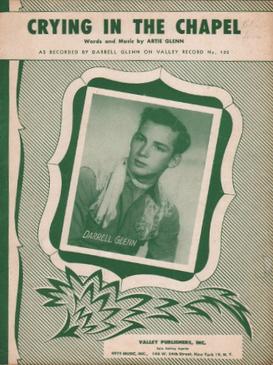
"Crying in the Chapel" is a song written by Artie Glenn and recorded by his son Darrell Glenn. The song was released in 1953 and reached number six on the Billboard chart.

"To Sir with Love" is the theme from James Clavell's 1967 film To Sir, with Love. The song was performed by British singer and actress Lulu, and written by Don Black and Mark London. Mickie Most produced the record, with Mike Leander arranging and conducting. The song peaked at the top of the Billboard Hot 100, and became the best-selling single of 1967 in the United States.

"I'll Take You There" is a song written by Al Bell, and originally performed by soul/gospel family band the Staple Singers. The Staple Singers version, produced by Bell, was released on Stax Records in February 1972, and spent a total of 15 weeks on the charts and reached #1 on the Billboard Hot 100. It is ranked as the 19th biggest American hit of 1972.

"Remember (Walking in the Sand)", also known as "Remember", is a song written by George "Shadow" Morton. It originally was recorded by the girl group the Shangri-Las, who had a top five hit with it in 1964. A remake by Aerosmith in 1979 was a minor hit. There have been many other versions of the song as well.
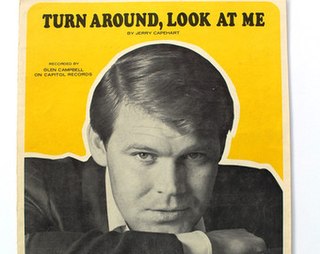
"Turn Around, Look at Me" is a song written by Jerry Capehart and Glen Campbell, though Campbell is not officially credited.
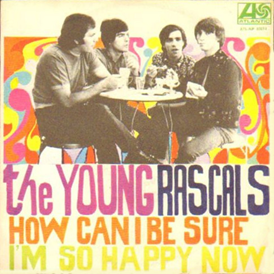
"How Can I Be Sure" is a popular song written by Felix Cavaliere and Eddie Brigati, and originally recorded by the Young Rascals for their 1967 album Groovin' with a single release in August 1967 affording the group their fourth Top 10 hit peaking at #4.
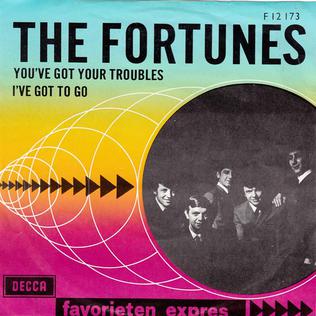
"You've Got Your Troubles" became the inaugural composition by the prolific songwriting team of Roger Cook and Roger Greenaway in 1964. "You've Got Your Troubles" became a number 2 UK hit for the Fortunes in the United Kingdom in August 1965, affording the group international success including a Top Ten ranking in the US. The track was included on the Fortunes' self-titled 1965 debut album release, the group's only album release of the 1960s.

"It's Not Unusual" is a song written by Les Reed and Gordon Mills, first recorded by a then-unknown Tom Jones, after it had first been offered to Sandie Shaw. He intended it as a demo for her, but when she heard it she was so impressed with his delivery that she recommended he sing it instead.

"Another Saturday Night" is a 1963 hit single by Sam Cooke from the album Ain't That Good News. The song was written by Cooke while touring in England when staying in a hotel where no female guests were allowed. It reached No. 10 on the Billboard Hot 100 and was No. 1 on the R&B chart for a single week. In the UK, the song peaked at No. 23 on the UK Singles Chart.

"Who Loves You" is the title song of a 1975 album by The Four Seasons. It was composed by Bob Gaudio and Judy Parker and produced by Gaudio. It reached number 3 on the Billboard Hot 100 in November 1975.
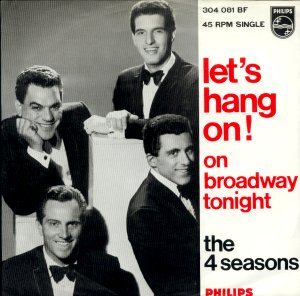
"Let's Hang On!" is a song composed by Bob Crewe, Sandy Linzer, and Denny Randell that was popularized by the Four Seasons in 1965.

"The Ballad of Bonnie and Clyde" is a song, written by Mitch Murray and Peter Callander, and recorded by the British rhythm and blues singer Georgie Fame. Released as a single, the song reached number one in the UK Singles Chart for one week from 24 January 1968. The song reached number seven in the US Billboard Chart later the same year.

"Georgy Girl" is a song by the Australian pop/folk music group The Seekers. It was used as the title song for the 1966 film of the same title. Tom Springfield, who had written "I'll Never Find Another You", composed the music and Jim Dale supplied the lyrics. The song is heard at both the beginning and end of the film, with markedly different lyrics. It was nominated for an Academy Award for Best Original Song but the prize went to "Born Free".
"Music to Watch Girls By" was the first Top 40 hit by Bob Crewe using his own name, recorded by his group The Bob Crewe Generation. The music was composed by Sidney "Sid" Ramin.
"Last Date" is a 1960 instrumental written and performed by Floyd Cramer. It exemplifies the "slip note" style of piano playing that Cramer made popular. It peaked at number 11 on the country chart and at number two on the Hot 100 behind "Are You Lonesome Tonight?" by Elvis Presley. Cramer's recording inspired a number of successful cover versions, including a vocal adaptation by Conway Twitty.

"Heaven Must Have Sent You" is a song written by Brian Holland, Lamont Dozier, and Eddie Holland when at Motown, and first recorded by The Elgins in 1966. It was also a 1979 disco hit single by Bonnie Pointer.

"How Sweet It Is (To Be Loved by You)" is a song recorded by American soul singer Marvin Gaye from his fifth studio album of the same name (1965). It was written in 1964 by the Motown songwriting team of Holland–Dozier–Holland, and produced by Brian Holland and Lamont Dozier. The song title was inspired by one of the actor and comedian Jackie Gleason's signature phrases, "How Sweet It Is!"

















